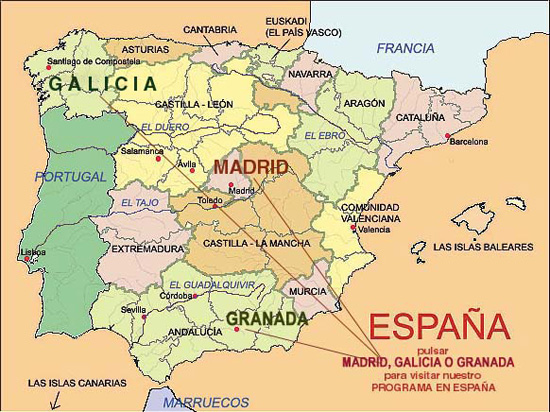Iberian Studies Major Unveiled this Fall
 |
| A new Iberian Studies major will enable students to focus primarily on Iberia, mainly Spain, but includes Portugal and former colonies. |
| Posted 07/28/06 |
| Iberian studies will be introduced as a new major by the Spanish section of the Romance Languages and Literatures Department this fall.
The major is designed for students interested in studying the literature, history, culture and society of the Iberian peninsula. The new major will complement the current Spanish major, which provides students with a broad knowledge of the Spanish-language literatures of Spain and Latin America. “Over the years students have repeatedly expressed an interest in a Spanish major that would allow them to study Spain in depth,” says Michael Armstrong-Roche, associate professor of Romance Languages and Literatures and head of the Spanish section. Iberian studies will enable students to focus primarily on Iberia, mainly Spain, but includes Portugal and former colonies. Lynn Cartwright-Punnett 07, was happy to switch from her double major in Spanish and History to Iberian Studies and History this past spring. “The Spanish major did a great job of integrating aspects of Spanish culture, but Spanish, as a major, also deals with Latin America, which I am less interested in, says Cartwright-Punnett Iberian Studies gives me more flexibility and relates more directly to my varied interests than purely literature based major would.” Incoming Wesleyan sophomore Bryan Jones also plans on majoring in Iberian studies, primarily in order to master the Catalan language of the Iberian Peninsula. “While visiting friends in Barcelona, I was intrigued by the Catalan language and culture, and have since obtained the desire to master that language as well as Spanish,” says Jones. “Clearly, the Iberian Studies major allows me to do so, as well as looks into the numerous Armstrong-Roche says that Iberian studies majors such as Cartwright-Punnett and Jones may count up to four courses taken outside the Spanish section in English or Spanish. “The requirements permit students to earn major credit for coursework on Iberia offered on campus outside the Spanish section, in the History Department, for instance, along with coursework on Iberia in fields other than literature offered by approved study abroad programs such as our own program in Madrid,” says Armstrong-Roche. Iberian studies majors must qualify for the major with a grade of B- or better in Spanish 221 or the equivalent. Spanish 221 is not required but may be counted towards the major. Students are expected to maintain at least a B- average in the major program and are required to do a minimum of five of their nine required courses in Spanish literature with faculty from the Spanish section of Wesleyan’s Romance Languages and Literatures Department. Armstrong-Roche says the Iberian studies major may interest students who want to pursue graduate work focused on Spain or other professional options that involve Spanish companies or international organizations. Cartwright-Punnett plans on turning her thesis about sites of memory from the Spanish Civil War into a tourist guide book about the history of the war and to teach high school, where she can use her European History and Spanish background. Jones is interested in working in Spain’s Catalonia region or in the U.S. teaching at a secondary school or hopes to land a job in international relations, either within a business or the government. For more information about the Iberian studies major, please contact Michael Armstrong-Roche at 860-685-3128, e-mail marmstrong@wesleyan.edu or visit http://www.wesleyan.edu/registrar/catalog/rlant.htm#Spanish. |
| By Laura Perillo, associate director of Media Relations |

